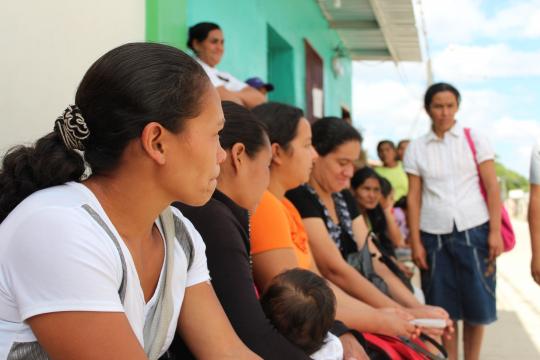
“Despite all the work that we have been doing, the number of women reporting domestic violence cases has been increasing,” one of the participants in a workshop of the Safer Municipalities project said, expressing his frustration. The Safer Municipalities project is an initiative of the Government of Honduras aimed at preventing violence nationwide. He added, “There must be something missing in the services and referral system we offer for domestic violence in the Municipal Office for Women.”
As the facilitators of the workshop discussion, we replied that quite the opposite was true: an increase in the reporting of domestic violence cases is a positive sign that there is growing confidence in local institutions and a result of the Municipal Office’s efforts. The challenge, we explained, is to address the causes of violence to better support prevention efforts and improve services and response systems.
The discussion occurred during a workshop on September 30 in La Ceiba, Honduras, which featured the participation of community leaders from the cities of Choloma, La Ceiba, and El Progreso. Organized by the Institute for Community Development, Water and Sanitation (IDECOAS) and the Vice Security Ministry for Violence Prevention with support from the World Bank Group (WBG), the objective of the discussion was to explore gender-based violence (GBV) in the three municipalities where homicide rates are also high.
This event was part of the Safer Municipalities project, a violence prevention initiative that aims to stimulate community engagement for high-risk groups, including youth, through vocational training and extracurricular activities. It is already reaching nine communities in the three municipalities with the objective of training parents and improving the local infrastructure to provide safe public spaces.
Workshop participants had the opportunity to discuss the different forms of GBV, including domestic and family violence, child abuse, dating violence, and sexual abuse. Among these, we explained that violence perpetrated by intimate partners is the most common form that women experience. The prevalence of intimate partner violence throughout the Latin America and Caribbean has been documented by The Pan-American Health Organization (PAHO).
In Honduras, according to the National Demographic and Health Survey (ENDESA, 2011-2012), 7.4 percent of women have experienced some form of physical violence at the hands of a partner in the last 12 months, a figure that is just below the 7.8 percent recorded in Guatemala (Reproductive Health Survey, 2005-2006).
This problem is even more complex when taking into account that being a victim of one form of violence increases the risk of experiencing other forms. For example, children who witness their mothers being abused have double the risk of repeating the same conduct or being victims of violence. In other words, the intergenerational effects of partner violence serve to perpetuate a cycle of violence. This underscores the importance of transforming relationships from the home outward to prevent violence.
Confronting this challenge requires an enormous collective effort that includes raising society’s awareness and changing attitudes and behaviors about gender dynamics. This effort often involves individuals, families, and communities. The key is to prevent violence before it occurs and improve institutional response mechanisms to address cases that do occur. In such an effort, it’s important to involve not only women, but also men and boys, with the main aim of promoting social change.
This is precisely the objective of the World Bank Group initiative “Using Evidence-Based Approaches to Strengthen Collective Action Against Intimate Partner Violence,” recently approved by the WBG Umbrella Facility for Gender Equality (UFGE), which will be implemented in two municipalities in Honduras and Guatemala.
This grant seeks to promote community participation in preventing and responding to intimate partner violence (IPV). This will be done through two streams of work: training workshops to build the capacity of local organizations to implement community-based IPV prevention activities, and “edutainment” tools such as awareness-raising campaigns, community theater, and social marketing.
Through this project, we hope to bring new understanding and offer tools to address GBV, an enormous problem that communities are aware they must address. This was apparent during the recent workshop, which reflected their commitment to keep working to eliminate all forms of violence in their communities.
Interventions that engage boys and young men in preventing violence against women will be discussed in the Conference #JóvenesSinViolencia that will take place in Antigua Guatemala on November 5 and 6.



Join the Conversation